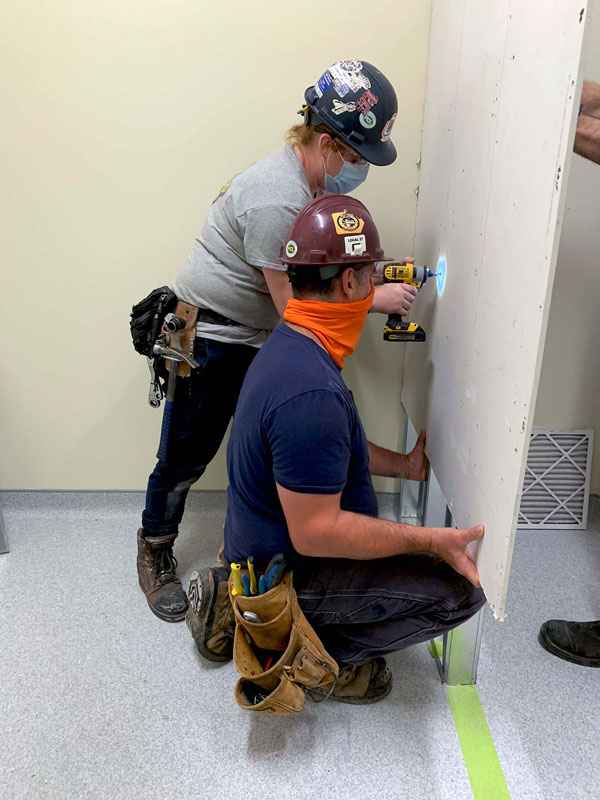The pandemic is a reminder of the importance of Infection Control Risk Assessment (ICRA) best practices in health care construction, and a sector that could see a surge of activity in Ontario is long-term care.
“Given the horrific circumstances in long-term care facilities that have been exposed by the recent COVID crisis, we expect to see the needs (for ICRA) increase…as old outdated facilities will need to be renovated and/or replaced by new safer facilities,” says Cristina Selva, executive director of the College of Carpenters and Allied Trades (CCAT) in Woodbridge, Ont.
Statistics from a study by the Carpenters’ District Council of Ontario indicate that roughly a third of Ontario’s long-term care (LTC) facilities were built at least 50 years ago.
An increase in nursing home renovations could bring more construction workers through the CCAT’s doors for its 24-hour ICRA training course which includes 16 hours of in-class theory and eight hours of hands-on training.
Aimed at carpenters, flooring installers and interior finishing and drywall mechanics, the course covers how to identify and minimize risks; ICRA protocols; proper use of HEPA equipment; bio-hazard PPE; and enclosures and containment barriers.

Graduates receive an ICRA certificate from the United Brotherhood of Carpenters’ International Training Center in the U.S., says Selva.
Before the Carpenters’ International Training Center developed the ICRA course a few years ago, there were no specific infection control training programs available for tradespeople working in occupied hospital and LTC facilities, she says.
“This course was essential in order to help protect both the patients residing in these facilities and the workers who may be exposed to contaminants while working on renovations/remodels,” she explains.
The CCAT’s 1,000 square foot lab mimics hospital spaces, including a nursing station and patient and operating rooms. It is built with similar building materials to provide an authentic setting.
Selva says statistics in the U.S. indicate upwards of 100,000 people die annually because of secondary infections they contract in hospital. One major cause is cross contamination which can occur during renovations.
“The removal of ceilings, walls, flooring etc. may release agents that have been trapped there. If not handled properly, these contaminants can travel through HVAC systems and other means,” she says.
Contractors, she says, are increasingly looking for carpenters, interior systems mechanics and flooring installers who have been trained in how to manage these situations.
The CCAT’s curriculum was developed by construction-related infection control experts and is updated periodically to be consistent with evolving industry standards, she says.
While in the lab, ICRA students must wear full PPE including masks, gloves and even Tyvek suits for some of the training.
Selva says while the lab was mainly intended to address conditions and possible dangers in health care renovations because of the risks posed to patients and workers, its relevance has been expanding to new builds.
Prompted by the pandemic, ICRA best practices could see expansion into other building and renovation sectors such as restaurants and food services, she says.
Selva says the CCAT has done the most training in ICRA across Canada, but the current health care crisis has generated more interest in setting up training from its sister locals throughout Canada.
“It was quite expensive, but we viewed it as an important investment in training to address the needs of a big piece of our market,” says Selva.
The CCAT has four instructors trained to deliver ICRA. They receive an ICRA certificate from the UBC International Training Centre.
The ICRA training meets the health and safety standards to protect workers imposed on employers under Section 25 of the Occupational Health and Safety Act, says Selva.











Recent Comments
comments for this post are closed